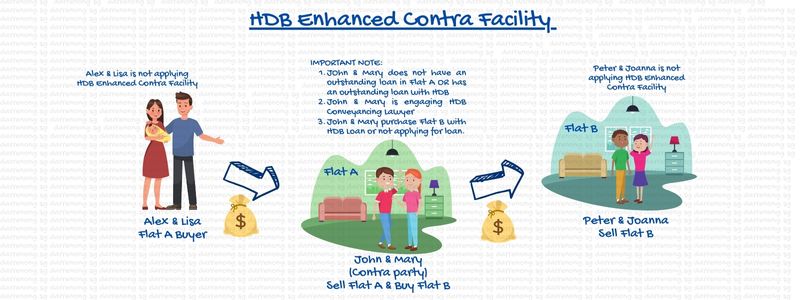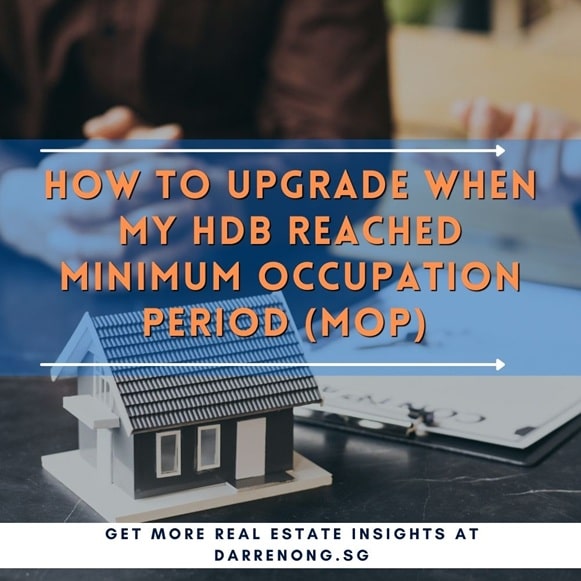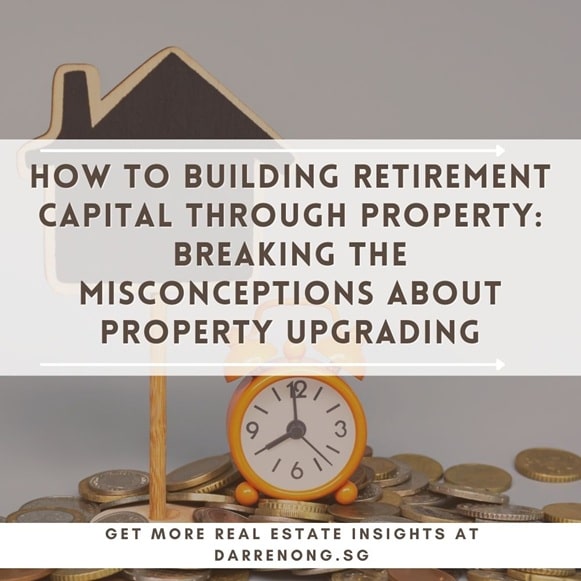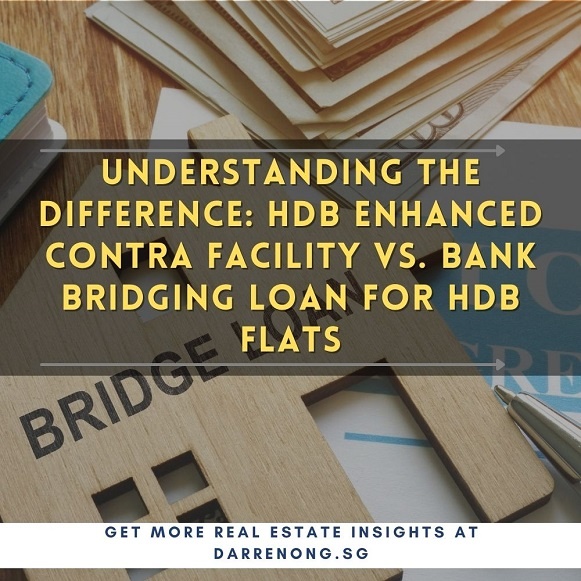Table of Contents
Understanding the Difference: HDB Enhanced Contra Facility vs. Bank Bridging Loan For HDB Flat
The property market in Singapore can be a complex endeavor, especially when transitioning from selling your current HDB flat to purchasing a new one. The timing and coordination of funds are crucial aspects that can significantly impact the smoothness and success of your property transactions. This is where financial solutions like the HDB Enhanced Contra Facility and bank bridging loans come into play, offering vital support in managing the cash flow between these consecutive property transactions.
The HDB Enhanced Contra Facility is a specialized financial tool designed to assist sellers and buyers of HDB flats in Singapore. It allows individuals to synchronize the sale of their existing flat and purchase a new one, thereby providing a streamlined solution for managing funds. This facility is particularly beneficial for those who require the sale proceeds of their current flat to finance the acquisition of their next home, ensuring a smoother transition without the burden of temporary cash shortfalls.
On the other hand, bank bridging loans offer an alternative avenue for managing financial liquidity during the property transition phase. These short-term loans are crafted to bridge the gap between selling your current property and acquiring your new home, ensuring that you have the necessary funds available when needed. Bridging loans is a versatile solution, providing immediate financial relief and flexibility, which can be crucial in the fast-paced Singapore property market.
Getting to know the details, benefits, and potential limitations of the HDB Enhanced Contra Facility and bank bridging loans is essential for making informed decisions that align with your financial circumstances and property goals. This article explores these financial solutions’ key features, eligibility criteria, and procedural aspects. It offers a comparative analysis to guide HDB flat buyers and sellers in choosing the option that best suits their needs.
By equipping yourself with knowledge of this temporary financial option, you can navigate the complexities of the property market with greater confidence and ease, ensuring a more seamless transition from your current HDB flat to your future home. Understanding these options can significantly enhance your property transaction experience in Singapore’s dynamic real estate environment, whether upgrading to a bigger flat or rightsizing to a smaller one.
In the following sections, we will explore the HDB Enhanced Contra Facility and bank bridging loans in greater detail, providing a clear and comprehensive overview to aid you in your property journey. Stay well-informed and prepared as you embark on the exciting transition from one HDB flat to another, making strategic financial decisions that pave the way for a smooth and successful property experience in Singapore.
HDB Enhanced Contra Facility (ECF)

The HDB Enhanced Contra Facility (ECF) is an innovative financial mechanism tailor-made for those engaging in the Singapore Housing Development Board (HDB) resale market. This unique facility is designed to aid HDB flat sellers and buyers by facilitating more efficient management of funds between selling an existing flat and purchasing the next one. Understanding the HDB Enhanced Contra Facility in detail can empower you with strategic advantages, ensuring a smoother and more financially viable transition between properties.
What is the HDB Enhanced Contra Facility?
At its core, the HDB Enhanced Contra Facility is a program that allows you to leverage the sales proceeds and existing mortgage of your current HDB flat toward the acquisition of your next one. This process streamlines the financial transactions and mitigates the liquidity crunch many face during the interim period of selling and buying HDB properties. By synchronizing these transactions, the Enhanced Contra Facility significantly reduces the transaction timeframe and financial strain and simplifies the complexities associated with property transition.

Eligibility Criteria for the Enhanced Contra Facility
Buyers must meet specific criteria to qualify for the HDB Enhanced Contra Facility, ensuring that this financial solution aligns with their transaction scenario. Key eligibility requirements include:
- The sale of an existing HDB flat (Flat A) and the purchase of another (Flat B) must be concurrent.
- Only the Flat A seller, known as the contra party, can apply for the Enhanced Contra Facility to finance the purchase of Flat B, including the insurance premium payable under the CPF Home Protection Scheme. Thus, the Flat A Buyer and the Flat B Seller cannot apply for the Enhanced Contra Facility.
- Flat A (selling) must be either with no outstanding loan or with an outstanding loan with HDB, and Flat B (buying) mortgage loan must be with HDB or not applying for any mortgage loan.
- The contra party must not be an undischarged bankrupt or have any bankruptcy proceedings commenced against him.
- The contra party must utilize all the CPF available savings in their CPF Ordinary Account (OA) and all the CPF monies that will be refunded to his CPF OA from the sale of Flat A to purchase Flat B. The buyer can only save up to 20k in their CPF OA account.
- The sales and purchase transaction must adhere to the HDB’s regulations, Housing & Development Act, and CPF Act concerning HDB property transactions.
- All the involved parties must agree to legally complete the transactions of both Flat A and Flat B within a stipulated timeframe.
Understanding these prerequisites is crucial for prospective applicants to determine their eligibility and to plan their property transactions accordingly.
Process and Timeline of the Enhanced Contra Facility
Utilizing the HDB Enhanced Contra Facility involves several critical steps, starting with the HDB resale application and the HDB Enhanced Contra Facility application, which all the sellers and buyers of Flat A and Flat B must submit concurrently with their HDB resale application.
The contra party must simultaneously apply the HDB Enhanced Contra Facility when submitting the HDB resale application.
Following approval, the refunded CPF monies and sales proceeds from your current flat (Flat A) are directly applied to the purchase price of your next flat (Flat B). The timeline for these transactions is tightly coordinated to ensure a seamless transition, highlighting the importance of meticulous planning and adherence to procedural timelines.
Advantages of the HDB Enhanced Contra Facility
Opting for the HDB Enhanced Contra Facility brings numerous benefits, including significant cost savings, as it eliminates the need for a temporary loan or additional financing. The convenience of having a single, integrated process for both transactions also reduces administrative burdens and enhances efficiency. Furthermore, the facility provides a safety net by aligning the sale and purchase timelines, thereby minimizing the risk of financial gaps.
Limitations of the HDB Enhanced Contra Facility
While the Enhanced Contra Facility offers several advantages, buyers should also be aware of its limitations. The facility’s applicability is confined to specific transaction scenarios and is subject to stringent eligibility criteria.
The following are some examples where HDB reserves the right not to approve the HDB Enhanced Contra Facility application:
- If there is a mortgage in favour of a financial institution (Bank loan), and/or CPF mortgage/charge on Flat A and/or Flat B. or
- If private solicitors (private law firms) have to be engaged by the contra-party for their conveyancing.
Another limitation is using the cash proceeds (cash profit) from the sale of Flat A to pay down the purchase of Flat B. The contra party must first use all their available CPF in the CPF OA account and all the CPF monies refunded from the sale of Flat A to pay down the purchase of Flat B before they can use the cash profit from Flat A to pay down the balance of the purchase price.
Do note that if the purchase of Flat B utilizes the 2nd HDB loan, the contra party also needs to use up to 50% of the cash proceeds from Flat A to lower the 2nd HDB loan.
Additionally, the reliance on the successful completion of both transactions means that any delay or issue in one can impact the other, necessitating a backup financial plan.
Bank Bridging Loan

Bank bridging loans emerge as a pivotal financing solution for many prospective HDB flat buyers in Singapore, offering a temporary financial cushion during the transition from selling one property to purchasing another. Unlike the HDB Enhanced Contra Facility, which is specifically designed for transactions within the HDB market, bank bridging loans provide a broader application scope, including both HDB and private property transactions. This versatility makes bridging loans an essential tool for buyers navigating the competitive Singapore property market.
Understanding Bank Bridging Loans
A bank bridging loan is a short-term loan designed to bridge the financial gap for property buyers awaiting the sales proceeds from their existing property. This type of loan is particularly beneficial in scenarios where the purchase of a new home precedes the sale of the current one, ensuring that buyers have the necessary funds to proceed with their new acquisition without delay. By offering immediate liquidity on, bridging loans are critical in facilitating seamless property transitions.
Do note that for HDB transactions, the bank will need the sales and purchase approval letter before the bridging loan disbursement.
Eligibility and Application Process of the Bank Bridging Loans
The eligibility criteria for bank bridging loans may vary across different financial institutions in Singapore. The borrower must apply for bank mortgage and bridging loans from the same bank during the home loan application phase. Singaporeans, Singapore PR, and foreigners who are selling their property in Singapore can choose to apply for the bridging loan, subject to bank approval. Typically, borrowers must provide proof of the sale of their existing property (Option to Purchase OTP documents) and the purchase agreement for the new property. Additional documents are needed also, including the CPF withdrawal statements and the current property outstanding loan statement, to determine the proceeds that will be available.
The application process thoroughly assesses the borrower’s financial health, including income, existing liabilities, and credit history. Prospective borrowers are advised to consult multiple banks to understand the specific requirements each bank offer and secure the best terms for their bridging loan.
Advantages of Opting for a Bank Bridging Loan
One of the key advantages of a bank bridging loan is its flexibility. Borrowers can benefit from immediate access to funds, allowing them to capitalize on time-sensitive property opportunities. Additionally, the loan amount is usually tailored to the individual’s financing needs and depends on the sales proceeds expected from the existing property. This financial flexibility is paramount in the dynamic Singapore property market, enabling buyers to navigate their property transactions more effectively.
For example, you decide to purchase a property at $1.5 million, pay the initial 5% cash, and secure a mortgage of 75%. But you need the current property sales proceeds and CPF money refunds to pay the balance of 20% of the purchase price. As such, you could apply for the bridging loan to pay the purchase first while waiting for the current property sales to proceed.
Repayment Terms and Considerations of the Bank Bridging Loans
Repayment of a bank bridging loan typically coincides with receiving sales proceeds from the sold property. Borrowers must clearly understand the repayment terms, including the loan tenure and interest rates, which can impact the overall cost of the loan. Bridging loans are meant for short-term financing; hence, the interest rates are usually higher (5%-6% p.a.) than those of conventional housing loans. This underscores the importance of good planning and right budgeting to ensure timely repayment and avoid accruing high interest costs.
Limitations and Risks of the Bank Bridging Loans
Despite their benefits, bank bridging loans come with their own set of limitations and risks. The cost of borrowing, including interest rates and processing fees, can add to the financial burden of property transactions. Additionally, the reliance on the successful sale of the existing property to repay the loan poses a risk if the property market faces a downturn or if the sale takes longer than expected. Therefore, it’s essential for borrowers to consider these factors and to have contingency plans in place.
Typical banks require repayment bridging loans within six months.
Comparative Analysis: HDB Enhanced Contra Facility vs. Bank Bridging Loan
When navigating the intricate landscape of the Singapore property market, understanding the nuances of financial aids like the HDB Enhanced Contra Facility and bank bridging loans can significantly influence your decision-making process. This comparative analysis aims to delineate each option’s distinctions, advantages, and potential drawbacks, providing a comprehensive perspective to aid HDB buyers and sellers in making informed choices.
Key Feature Comparison between HDB Enhanced Contra Facility and Bank Bridging Loan
| Feature | HDB Enhanced Contra Facility | Bank Bridging Loan |
|---|---|---|
| Purpose and Usage | Facilitates funds transition specifically for HDB transactions. | Offers immediate financial aid for both HDB and private property transactions. |
| Eligibility Criteria | Limited to specific HDB conditions. | Based on the borrower’s financial status and the bank’s criteria, applicable broadly. |
| Financial Implications | Utilizes direct sales proceeds; can avoid additional loans. | Requires understanding of interest rates, fees, and timely repayment. |
| Process and Timeline | Integrated within HDB transactions; less flexibility. | Provides immediate liquidity; requires stringent repayment post-sale. For HDB, the bank will need the HDB sale approval before the bridging loan can be disbursed. |
| Advantages | Cost savings, simplicity in transaction coordination. | Flexibility, immediate fund access. |
| Drawbacks | Applicability only to HDB transactions, dependent on timing. | Higher short-term borrowing costs, financial risk if sale delays. |
Conclusion: Understanding Your Financial Choices for HDB Transactions
After looking at the details of the HDB Enhanced Contra Facility and bank bridging loans, it’s clear that each option has its own set of advantages and limits. They serve different purposes depending on your situation in Singapore’s housing market. Choosing between the HDB Enhanced Contra Facility (HDB Loan or No Loan) and a bank bridging loan (Bank Loan) should be based on understanding your financial situation, how fast you need to move between homes, and what you want in the long run.
The HDB Enhanced Contra Facility is excellent for those buying and selling HDB flats and want a smooth process without needing extra loans. On the other hand, a bank bridging loan can be helpful for various types of property deals, giving you quick access to money when you need it.
Before deciding, it’s essential to carefully consider what each option offers and how it fits your personal and financial goals. This way, you can make a choice that helps you manage your money wisely and meet your property needs, leading to a successful property deal.
Get the Right Help for Your Property Deal
Making decisions about property and finances can be challenging, but you don’t have to do it alone. Whether you’re considering using the HDB Enhanced Contra Facility or a bank bridging loan, depending on your situation or the type of loan needed, getting expert advice can make things much clearer and easier.
I’m here to offer personalized help and information that fits your situation. I can assist you in understanding Singapore’s housing market better, helping you with your financial decisions and property plans.
If you’re looking for guidance or have questions about your property deal, connect with me today. I’m ready to help you make informed choices and support you in achieving your property goals in Singapore.
Need Real Estate Consultation?
Contact Me
Feel free to connect with me!
Senior Associate District Director
Huttons Asia Pte Ltd
CEA Registration No.: R026434F
Agency License: L3008899K
Contact: 93839588

Buying a Property in Singapore? 8 Key Tips on What to Look Out For
What to look out for when buying a condo or property in Singapore? Learn 8 key tips to help you choose or spot the right property for investment or own stay with capital appreciation and exit strategy.

Is It Still Safe to Enter the Property Market In 2025 Amid U.S. Tariffs?
How Trump’s Tariffs Could Affect Singapore’s Condo And HDB Prices. Is it safe to enter the Singapore property market in 2025 amid recession fears and U.S. tariffs? Learn how interest rates, supply trends, and market resilience could shape your next move.

How to Upgrade When My HDB Reached Minimum Occupation Period (MOP)
For HDB owners who have fulfilled the 5-year MOP (Minimum Occupation Period) in Singapore, discover your next move. Find out if you should sell your flat (resale HDB) or upgrade to a private property, with clear tips for smart homeownership planning.

Freehold Vs Leasehold Properties, Which Suit You Best?
Explore the key differences between freehold and leasehold properties in Singapore. Understand their advantages, investment potential, and determine which property type aligns with your goals.

How Much Do You Need to Earn to Afford a Condo in Singapore?
How much salary do you need to buy a condo in Singapore? Calculate loan, cash, CPF needed & avoid costly mistakes. Read the full guide now!

How To Building Retirement Capital Through Property: Breaking the Misconceptions About Property Upgrading
Looking to grow your retirement capital in Singapore? Discover how smart property upgrading and strategic investments can accelerate your wealth-building journey. From first-time buyers to seasoned homeowners, learn how to leverage property for long-term financial freedom.




